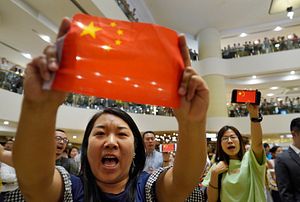Amid the external pressure of the U.S.-China trade war and growing criticisms of the Xinjiang re-education camps, coupled with skyrocketing pork prices at home, Beijing took advantage of the Hong Kong issue to launch a nationwide campaign for safeguarding China’s sovereignty against separatism and foreign instigation. The combative official narrative that permeated news networks, Baidu search engine results, and popular social media with such force is puzzling given that the protests started mildly and focused on appeals for autonomy. Marked exposure and overhyping of separatism risked discrediting the “one country two systems” setup and led to accusations of ineffective governance as well as generating further tension with the U.S. and the EU. This poses the question of why the Chinese Communist Party (CCP) adopted these unnecessary measures, which served to exacerbate international conflicts and widen the Mainland-Hong Kong division.
A clue can be found in the first eight characters of the theme of the 19th CCP National Congress –“不忘初心,牢记使命,” which translates to “Remain true to our original aspiration and keep our mission firmly in mind.” The implication is that ideological cohesion should be at the core of governance – especially in unsettling times.
When scholars and analysts are asked to list China’s key national interests, the security of the CCP and its leadership would easily come out on top. In understanding the factors and scenarios most threatening to the CCP’s preservation, Chinese leadership often refer to the collapse of the Soviet Union as a warning. As early as January 2013, having just assumed the CCP’s top post, Xi Jinping remarked that the failure of the USSR was largely due to a failure to stand firm on its core ideologies. As Xi put it, “when the ideology was in chaos, the party organizations became useless and lost its command over the army.” This was followed by the command for CCP officials at all levels to watch videos on the collapse of the Soviet Union.
Thus, haunted by the Soviet collapse, the CCP leadership launched a grand “remain true to our original aspiration and keep our mission firmly in mind”-themed education campaign to ensure the devotion of party members as the Hong Kong protests coupled with heightened external pressure. The concern for ideological cohesion and belief in the system is demonstrated in Xi’s call for confidence and unity in the face of “a complex external environment and mounting pressure.”
The ideological warfare within the bureaucracy is accompanied by stoking the idea of a separatist threat in the public eye in order to inflame nationalist sentiments. As the leadership is aware that the appeal of communist ideologies has declined and that population’s loyalty toward the party is not discernable, nationalism became the tool of choice for conducting ideological warfare in the public dimension.
Propelled by the CCP’s paranoia for internal turbulence while under threat and the Tiananmen incident experience — which demonstrated that even the smallest of compromises could lead to landslide public opposition — the leadership marshaled ethnocentric public outrage over the Hong Kong protests. The goal was to deter forces, either domestic or foreign, from challenging the Party’s authority.
As a result, images of Chinese diplomats and ministry spokespeople lashing out at “foreign instigators in Hong Kong” sprouted on short video app Douyin, and officially backed demonstrations of nationalist pride on school campuses and streets pervaded social media network Weibo. The display of such assertiveness should be interpreted as the government’s attempts at projecting strength toward the domestic realm – the CCP’s main audience.
Despite the evident risks, the intensity of the nationalistic campaign also runs along with the rationale of securing Xi’s authority, especially amid speculation that the Central Committee’s fourth plenary session was delayed due to internal power struggles. While Xi’s consolidation of power has seemingly eliminated dissenting voices at all levels of the Chinese state, there is still a considerable number of officials, intellectuals, and entrepreneurs within the establishment holding democratic values in favor of political reform. Also, the centralization of power in Xi thanks to the removal of presidential term limits also implies greater responsibility and vulnerability in case of governance setbacks. The nationalism warfare can thus be treated as a measure to counter domestic challenges, especially given that China’s GDP growth has slumped to its lowest in 27 years.
The view that the leadership’s combative nationalistic campaign is in essence aimed at domestic audiences also explains why China was quick to back down during the NBA dispute. Faced with the grave concern that deepening conflicts could derail trade talks with the United States and due to the risk of stoking global support for Hong Kong, China systematically quelled public protests against the NBA by enforcing silence on the issue and censoring related social media contents.
Although the famous recommendation that “to resist foreign aggression we must first pacify the home” (攘外必先安内) came from Chiang Kai-shek, it has been a doctrine for Chinese leaders throughout history.
Jo Kim holds an M.L. in international politics at Fudan University. Kim currently resides in Shanghai and is an active observer in cross-strait relations.

































